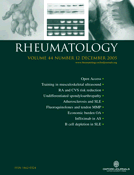-
PDF
- Split View
-
Views
-
Cite
Cite
A. Adebajo, K. Windsor, A. Hassell, J. Dacre, Undergraduate education in rheumatology, Rheumatology, Volume 44, Issue 9, September 2005, Pages 1202–1203, https://doi.org/10.1093/rheumatology/keh677
Close - Share Icon Share
Sir, We are encouraged by the recent article by Goh et al. [1], which reviews the need for a rheumatology curriculum. We agree that further progress is necessary to incorporate rheumatology into the core components taught in our medical schools, particularly in view of the high prevalence of rheumatic conditions in the community.
In support of this, the charity the Arthritis Research Campaign (arc) has published an education strategy (www.arc.org.uk), and has, over the last few years, developed a number of initiatives to address this problem. Through its Teaching the Teachers workshops, arc has been encouraging rheumatologists to develop their skills as clinical teachers. Our belief is that, through direct teaching involvement as well as by becoming champions and role models, teachers and rheumatologists within the specialty can have a significant impact on the undergraduate curriculum. At arc's national Teaching the Teachers workshop in Northumberland in 2002, emphasis was placed on the development of an extended musculoskeletal clinical examination for undergraduates. More recently, this has led to the development of a regional musculoskeletal examination (REMS) alongside the well-validated GALS screening examination.
At the national Teaching the Teachers workshop in Sheffield in 2003, agreement was reached that musculoskeletal history-taking and musculoskeletal examination were essential core skills for all undergraduates. It was also agreed that this should be achieved through ‘spiral learning’, whereby musculoskeletal learning opportunities as well as associated assessments are provided throughout the undergraduate curriculum rather than simply at one or two time points. At the Sheffield conference, a national collection of extended matching questions and objective structured clinical examination (OSCE) stations in rheumatology was developed and made available to all UK medical schools. This built on the development work in previous arc Teaching the Teachers workshops.
It is our belief (and experience) that assessment drives learning, and in May 2004 the most recent Teaching the Teachers workshop focused on competency-based assessments and performance relevant to both undergraduate and postgraduate medical training. The workshop was extended to professions allied to rheumatology, and there were many multiprofessional sessions.
In addition to the promotion of undergraduate electives and self-selective components in rheumatology for undergraduates, the arc has also developed a range of literature and electronic resources for undergraduates. Later in the year, the charity hopes to launch a graduate certificate in rheumatology practice for allied health professionals, which will be awarded by a UK university and endorsed and supported by arc. This will further the charity's support of allied health professionals working with patients with musculoskeletal disorders.
We believe that, through these and other ongoing developments, several of the issues raised by Goh et al. are being addressed. Evaluation of several of these initiatives indicates that they are beginning to have a significant impact on the various undergraduate curricula in the UK.
K.W. is employed by the Arthritis Research Campaign. The other authors have declared no conflicts of interest.
References
Author notes
1Academic Rheumatology Group, Division of Genomic Medicine, University of Sheffield, Beech Hill Rd, Sheffield S10 2RX, 2arc, Arthritis Research Campaign, Copeman House, St Mary's Court, St Mary's Gate, Chesterfield, Derbyshire S41 7TD, 3University College London, Gower Street, London WCIE 6BT and 4Academic Centre for Medical Education, 4th Floor, Holborn Union Building, Archway Campus, Highgate Hill, London N19 5LW, UK




Comments